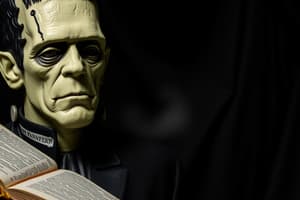Podcast
Questions and Answers
What does Victor ask Walton to do if he should die?
What does Victor ask Walton to do if he should die?
- Continue his quest to find and kill the monster (correct)
- Build a new ship
- Share his story with others
- Return home immediately
What happens to Victor at the end of the story?
What happens to Victor at the end of the story?
He dies.
Victor's mind remains stable throughout his pursuit of the monster.
Victor's mind remains stable throughout his pursuit of the monster.
False (B)
Which character becomes indistinguishable from Victor in the final chapter?
Which character becomes indistinguishable from Victor in the final chapter?
Victor describes himself as 'like the archangel who aspired to omnipotence, I am chained in an eternal ____.'
Victor describes himself as 'like the archangel who aspired to omnipotence, I am chained in an eternal ____.'
What do fire and ice symbolize in Frankenstein?
What do fire and ice symbolize in Frankenstein?
What theme does the monster's statement about being alone symbolize?
What theme does the monster's statement about being alone symbolize?
All quests in Frankenstein end in success.
All quests in Frankenstein end in success.
What realization does Walton come to in his last letter?
What realization does Walton come to in his last letter?
Whose unhinged mind is reflected in the quote about hearing the 'fiendish laugh'?
Whose unhinged mind is reflected in the quote about hearing the 'fiendish laugh'?
The phrase 'the die is cast; I have consented to return if we are not destroyed' reflects Walton's feelings of ____ and indecision.
The phrase 'the die is cast; I have consented to return if we are not destroyed' reflects Walton's feelings of ____ and indecision.
Flashcards are hidden until you start studying
Study Notes
Summary
- Victor concludes his narrative with a vow for revenge on the monster, asking Walton to continue his pursuit if he dies.
- Walton resumes the story through letters to Margaret, as the ship faces destruction by ice, leading to crew unrest.
- Victor's death occurs before Walton discovers the monster mourning over him, revealing the creature's remorse and anguish.
- The monster attempts to eliminate himself, disappearing into the Arctic darkness after sharing his suffering.
Victor's Madness
- Victor's mental instability becomes apparent during his quest through Europe, Russia, and the Arctic, reflecting his prior confinement in an asylum.
- His delusions manifest during a visit to a cemetery, where he believes spirits linger, highlighting his psychological deterioration.
- Victor's rage and curses are met with the monster's mocking laughter, product of his crumbling sanity, as he misinterprets the monster's actions as benevolent.
Convergence of Narratives
- The intertwining of Victor and the monster's journeys blurs their identities, both characterized by vengeance and misery.
- Walton's description of Victor reveals a duality, showcasing the monster's inner emergence as Victor transforms in rage.
- This transformative moment echoes the duality themes in other literary works, such as Jekyll and Hyde.
Reflections on Evil
- Victor expresses feeling like an evil spirit, reflecting on his initially benevolent intentions that have turned into horrific actions.
Symbolism of Fire and Ice
- Fire symbolizes life, while ice represents death and repression; their interplay is central to the narrative.
- Walton’s dreams contrast with Victor’s visions of animating lifeless matter, culminating with the monster's desire to burn his body to ashes to end his misery.
Gothic Literature Endings
- Traditional gothic endings feature heroes overcoming villains and restoring societal order, often through marriage; these conventions are parodied in works like Jane Austen’s Northanger Abbey.
Lack of 'Perfect Felicity'
- The story concludes with failure and high mortality, maintaining ambiguity about future prospects and the fates of Walton and the monster.
- The open-ended conclusion leaves uncertainty about the outcomes beyond the text.
Link to Milton’s Satan
- Victor likens himself to Milton's Satan, suggesting parallels between himself and the monster, reinforcing the romantic satanic hero motif and illustrating internal hell.
Theme of Doubling
- The 15-minute silent 1910 film reflects the theme of doubling through Victor's interaction with his own mirrored image as the monster's reflection fades, signaling their entangled fates.
Weather as Reflection of Emotion
- The harsh weather, described as "roaring like thunder," mirrors Victor's emotional turmoil and vengeful mindset.
Loss of Control
- Victor's diminishing control over the monster is captured in the imagery of "mountains of ice," symbolizing the monster's newfound power and unpredictability.
Isolation and Desolation
- The monster compares himself to Lucifer, illustrating profound isolation as he realizes that unlike the fallen angel, he has no companions in his suffering.
Loss of Innocence
- The monster challenges societal norms, portraying himself as innocent while condemning humanity for isolating him, embodying the theme of lost innocence.
Walton's Disappointment
- In his final letter, Walton expresses disillusionment, prioritizing safety over the pursuit of knowledge, marking a significant character development as he acknowledges the risks of ambition compared to life and well-being.
Studying That Suits You
Use AI to generate personalized quizzes and flashcards to suit your learning preferences.




